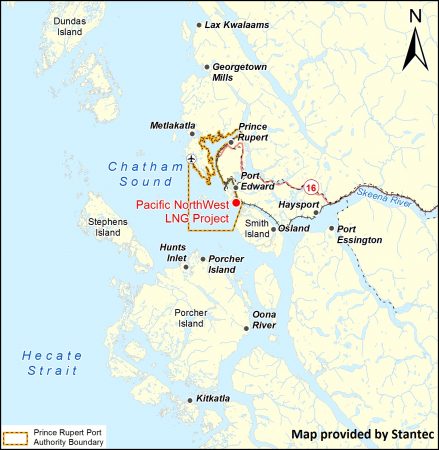
$36B Pacific Northwest LNG megaproject not going ahead *Updated
by Canadian Manufacturing.com Staff, with files from Ian Bickis and Aleksandra Sagan, The Canadian Press

The planned liquefied natural gas export facility near Prince Rupert, B.C., got regulatory approval last fall, but Petronas and its partners have decided not to move forward. They blamed depressed LNG prices and shifts in the energy industry

The proposed site of Pacific Northwest LNG, which its backers assert is being shut down because of adverse market conditions. PHOTO: Government of Canada
VANCOUVER—Pacific Northwest LNG says it will not be proceeding with the liquefied natural gas megaproject it had planned for the West Coast.
The consortium says the decision by Petronas, Malaysia’s state oil and gas corporation, and its partners came after a careful review amid changes in market conditions.
Pacific NorthWest LNG was a liquefied natural gas export operation. A facility on Lelu Island, near Prince Rupert, B.C., was supposed to process natural gas from the Montney shale formation on the B.C.-Alberta border, gas that would be compressed into liquid form and shipped to markets in Asia.
The overall project would have cost $36 billion in total, including a 900-kilometre pipeline proposed by TransCanada to the Lelu Island export terminal, as well as the production of gas to supply it.
TransCanada later said it was reviewing its options on the $5-billion Prince Rupert Gas Transmission project, which was dealt its own setback last week after the Federal Court of Appeal ruled that the National Energy Board will need to reconsider whether it requires federal approval.
The project’s Lelu Island export facility was estimated to cost $11.4 billion.
Pacific NorthWest LNG is majority-owned by Petronas, while Japan Petroleum Export Corporation, PetroleumBrunei, IndianOil Corporation and Sinopec-China Huadian are also partners.
“We are disappointed that the extremely challenging environment brought about by the prolonged depressed prices and shifts in the energy industry have led us to this decision,” said Petronas’ executive vice president & CEO (Upstream) Datuk Mohd Anuar bin Taib.
Taib asserted that the decision was simple economics—a world market awash in liquefied natural gas, which has driven down prices, making Pacific NorthWest LNG no longer financially viable.
While Pacific NorthWest LNG worked its way through regulatory channels over the last several years, numerous LNG projects have come online around the world.
The announcement Tuesday ends months of anticipation on the fate of what would have been one of Canada’s largest private infrastructure investments, and it came a couple of hours after Prime Minister Justin Trudeau met with British Columbia Premier John Horgan in Ottawa.
The federal government gave its conditional approval to the project last September.
Horgan voiced opposition to it, though late last month he said his position may be swayed if the concerns of First Nations were taken into consideration.
Both the federal and provincial governments emphasized that the decision was a private sector one.
“The company was very clear: this was a decision they are making because of the economic challenges in the global energy market place,” B.C. Energy Minister Michelle Mungall said.
“The Pacific NorthWest LNG project as proposed in its current state was uneconomical to move forward.”
Mungall said the government would work to make B.C. competitive in the global LNG industry as other proposed West Coast LNG projects sit in various stages of development.
The B.C. Liberal caucus was quick to lay blame on what it called a “closed for business” agenda of the newly sworn-in B.C. NDP government.
But when asked whether the election of the NDP played any role in the decision, Taib gave an unequivocal no. He said Petronas is still committed to working on developing the natural gas assets in northeastern B.C. it bought in part to supply the LNG terminal.
“We actually look forward to working with John Horgan and his government as we develop our vast assets in the Montney joint venture area,” he said.
B.C. Green Leader Andrew Weaver, who is helping prop up the NDP government in a coalition, said the singular pursuit of the LNG industry by the former B.C. Liberal government was a mistake.
“B.C.’s future does not lie in chasing yesterday’s fossil fuel economy,” Weaver said in a statement. “It lies in taking advantage of opportunities in the emerging economy in order to create economic prosperity in B.C.”
Environmentalists and some First Nations welcomed news of Pacific NorthWest LNG’s demise, saying it would have resulted in a spike in greenhouse gas emissions and threatened salmon habitats.
“We’re absolutely thrilled that the Malaysian backers of this liquefied natural gas terminal have backed down from their reckless plan to jeopardize B.C.’s second largest salmon run and blow our provincial climate targets,” Peter McCartney, climate campaigner for the Wilderness Committee, said in a statement.